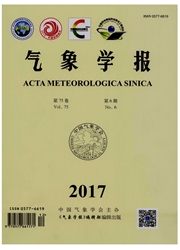

 中文摘要:
中文摘要:
利用1951-2009年线性最优插值全球海温资料,NCEP/NCAR再分析大气资料,以及中国160个站的降水资料等,重点分析了不同分布型厄尔尼诺事件的海温演变特征及对应的热带大气的响应情况,并进一步探讨了不同分布型厄尔尼诺事件对次年夏季中国降水的可能影响。根据厄尔尼诺事件发展达到盛期时海温距平的分布特点,将1950年以来的厄尔尼诺事件分为东部型、中部型和混合型。不同分布型厄尔尼诺事件的海温演变及后期的发展都表现出较为明显的差异,对应的热带太平洋上空向外长波辐射距平分布及热带印度洋一太平洋上空的沃克环流异常也表现出明显的不同。在厄尔尼诺的次年夏季,通过影响850hPa风场、水汽输送及500hPa西太平洋副热带高压系统,东部型、中部型及混合型厄尔尼诺事件可能分别导致中国雨带呈现南方型(III类)、中间型(II类)和北方型(I类)的分布特点。
 英文摘要:
英文摘要:
According to the SSTA distribution during the peak phase of the El Nino event, the paper classified all the El Nino events since 1950 into Eastern Pacific type (EP), Central Pacific type (CP), and Mixed type. Different types of El Nino showed dissimilar developing features of SSTA, also with distinct responses of the Outgoing Longwave Radiation (OLR) anomalies and the anomalous Walker Cell over the tropical Indian Pacific Ocean. In the following summer of an El Nino event, through influencing 850 hPa wind, water vapor transport, and 500 hPa western Pacific subtropical High, EP El Nifio, CP El Nino, and Mixed El Nino would possibly induce Type III, Type II, and Type I of the summer rainfall pattern in China.
 同期刊论文项目
同期刊论文项目
 同项目期刊论文
同项目期刊论文
 期刊信息
期刊信息
